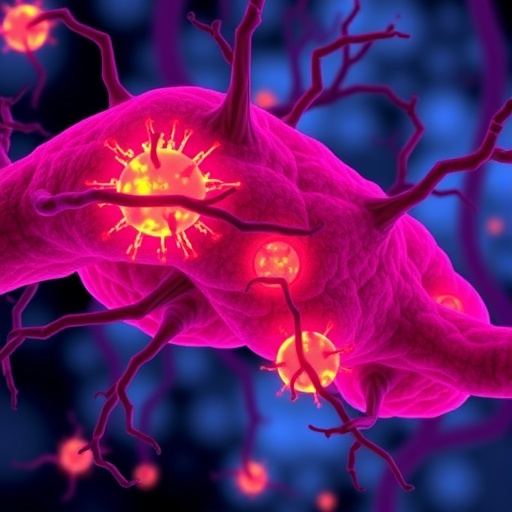In a groundbreaking study published in the journal Immunity, researchers led by Dr. Angela Riedel at the Mildred Scheel Early Career Centre (MSNZ), Würzburg University Hospital, have unveiled novel mechanistic insights into the metastatic progression of triple-negative breast cancer (TNBC). This aggressive breast cancer subtype, which disproportionately affects younger women and lacks targeted hormone receptors, has posed significant therapeutic challenges. The team’s work elucidates a TLR4-dependent fibroblast-monocyte signaling axis within tumor-draining lymph nodes (TDLNs) that fosters a pro-metastatic microenvironment, potentially paving the way for innovative immunotherapeutic strategies.
The sentinel lymph node (SLN), the primary lymphatic structure draining the breast tumor site, plays a dual role: it acts as an immunological hub coordinating anti-tumor immunity while simultaneously serving as a reservoir for metastatic cancer cells. Traditionally considered a passive conduit for metastasis, this new research reveals that the tumor can orchestrate extensive immune remodeling in the draining lymph nodes well before metastatic seeding occurs. By manipulating stromal and immune components, the primary tumor effectively preconditions the SLN, creating a permissive niche that facilitates subsequent tumor spread.
Central to this reprogramming are fibroblastic reticulum cells (FRCs), specialized mesenchymal stromal cells that maintain lymph node architecture and regulate immune cell migration and activation. Dr. Riedel’s team demonstrated that FRCs in TDLNs undergo a phenotypic transformation upon activation of Toll-like receptor 4 (TLR4), a pattern recognition receptor typically engaged during microbial infection. Intriguingly, tumor-derived factors co-opt this innate immunity sensor to induce FRCs to secrete chemokines such as CCL2 and CCL7, which recruit monocytes into the lymph node microenvironment.
These recruited monocytes, which are normally instrumental in antigen presentation and immune surveillance, become corrupted within the altered stromal milieu. They acquire immunosuppressive characteristics that inhibit the cytotoxic activity of T cells, the primary effectors of anti-tumor immunity. Using cutting-edge spatial transcriptomics and single-cell RNA sequencing, the investigators identified clusters of these suppressive monocytes closely associated with FRC networks and T cells within discrete lymph node niches. This spatially resolved immune landscape suggests a coordinated orchestration of immune evasion that supports metastatic colonization.
The study further explored the therapeutic potential of interrupting this signaling cascade. Employing preclinical murine models of TNBC, the researchers applied a targeted blockade of TLR4 within the tumor-draining lymph nodes. Results showed a remarkable restoration of T cell activity and a profound reduction in metastatic burden, particularly in the lungs—a common site for TNBC dissemination. Notably, combining TLR4 inhibition with checkpoint blockade immunotherapy targeting the PD-1/PD-L1 axis synergistically enhanced anti-tumor responses, suggesting a promising combinatorial approach for limiting metastatic progression.
Collaborative efforts with clinical departments at Würzburg University Hospital enabled confirmation that this mechanistic pathway is conserved in patients with TNBC. Analyses of patient lymph node samples revealed similar patterns of monocyte-mediated immunosuppression and FRC activation, reinforcing the translational relevance of targeting this immune-stromal crosstalk. Importantly, the researchers highlighted PD-L1 expression on monocytes within the tumor-draining lymph nodes as a potential biomarker for stratifying patients likely to benefit from PD-1 checkpoint blockade therapies, independent of tumor PD-L1 status.
The implications of these findings extend beyond immunotherapy responsiveness. By elucidating the early tumor-induced alterations in lymph node environments, the study broadens the conceptual framework for metastasis prevention. Targeting the pre-metastatic niche within lymph nodes could disrupt the earliest stages of metastatic dissemination, potentially transforming clinical approaches to managing high-risk breast cancer patients. This research underscores the lymph node’s active role in cancer immune evasion and highlights stromal-immune interactions as critical therapeutic targets.
Furthermore, the work by Dr. Riedel and colleagues underscores how sophisticated technologies such as proteomics, immunofluorescence, and advanced bioinformatics are revolutionizing our understanding of tumor immunology. Their integrated experimental approach, combining patient-derived data and animal models, provides robust evidence for the dynamic interplay between tumor cells and the immune microenvironment. Such interdisciplinary strategies are essential for developing next-generation precision therapies.
The study also advances the understanding of the innate immune system’s complexity in cancer. While Toll-like receptors like TLR4 are classically associated with antimicrobial defense, their aberrant activation in cancer-associated stromal cells reveals a subversive mechanism exploited by tumors to evade immune destruction. These insights suggest that canonical immune pathways may have context-dependent roles during disease progression, highlighting the need for nuanced therapeutic modulation.
In the broader landscape of cancer treatment, the findings resonate with the burgeoning focus on the immune system’s role in tumor dynamics. As immunotherapies gain prominence, dissecting the multifaceted interactions within the tumor microenvironment, especially in lymphoid tissues, will be pivotal for enhancing clinical efficacy. Moreover, the team points to the potential benefits of local immunotherapy administration—delivering treatments directly near lymph nodes—to augment therapeutic outcomes while minimizing systemic toxicity.
Dr. Riedel’s pioneering work demonstrates how fundamental research can drive clinical innovation. Her dedication to understanding the immunobiology of metastatic niches offers hope for patients battling aggressive breast cancer subtypes like TNBC. Supported by significant third-party funding from leading foundations, her research exemplifies the integration of molecular biotechnology and clinical oncology to tackle pressing medical challenges.
As the scientific community continues to unravel the intricate mechanisms governing tumor-immune interactions, studies like this pave the way for precision medicine approaches that not only treat the primary tumor but also proactively inhibit metastasis. By targeting the earliest immune escape mechanisms in tumor-draining lymph nodes, we stand on the cusp of redefining cancer therapeutics and improving survival outcomes for patients worldwide.
Subject of Research: People
Article Title: A TLR4-dependent fibroblast-monocyte axis in tumor-draining lymph nodes contributes to metastasis in triple-negative breast cancer
News Publication Date: 15-Sep-2025
Web References:
Article in Immunity
Image Credits: Greta Mattavelli, in Mattavelli et al, Immunity (2025)
Keywords: Breast cancer, Metastasis, Lymph nodes, Immune system
Tags: cancer metastasis mechanismsfibroblast-monocyte signaling axisimmune remodeling in cancerimmunotherapeutic strategies for cancerinnovative cancer treatment approacheslymph node immune healthmetastatic progression of breast cancersentinel lymph node functionstromal cell roles in immunityTLR4-dependent signaling in cancertriple-negative breast cancer researchtumor-draining lymph nodes





